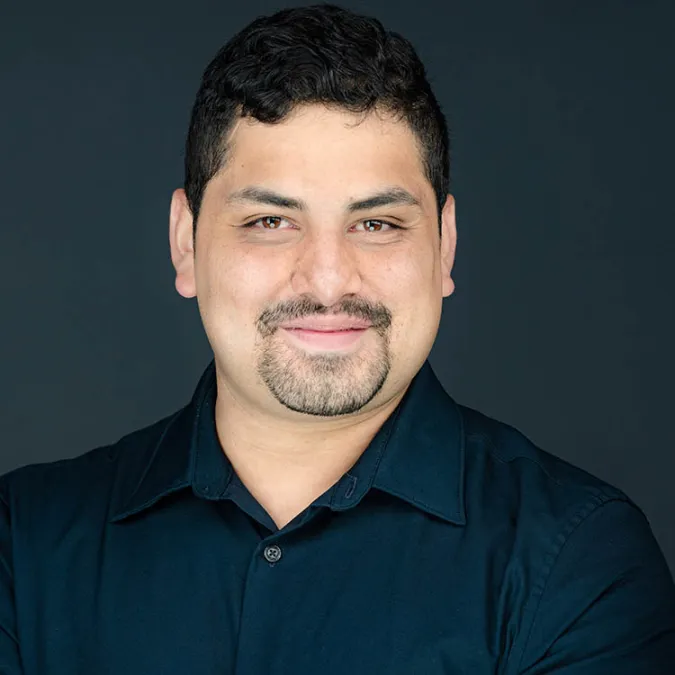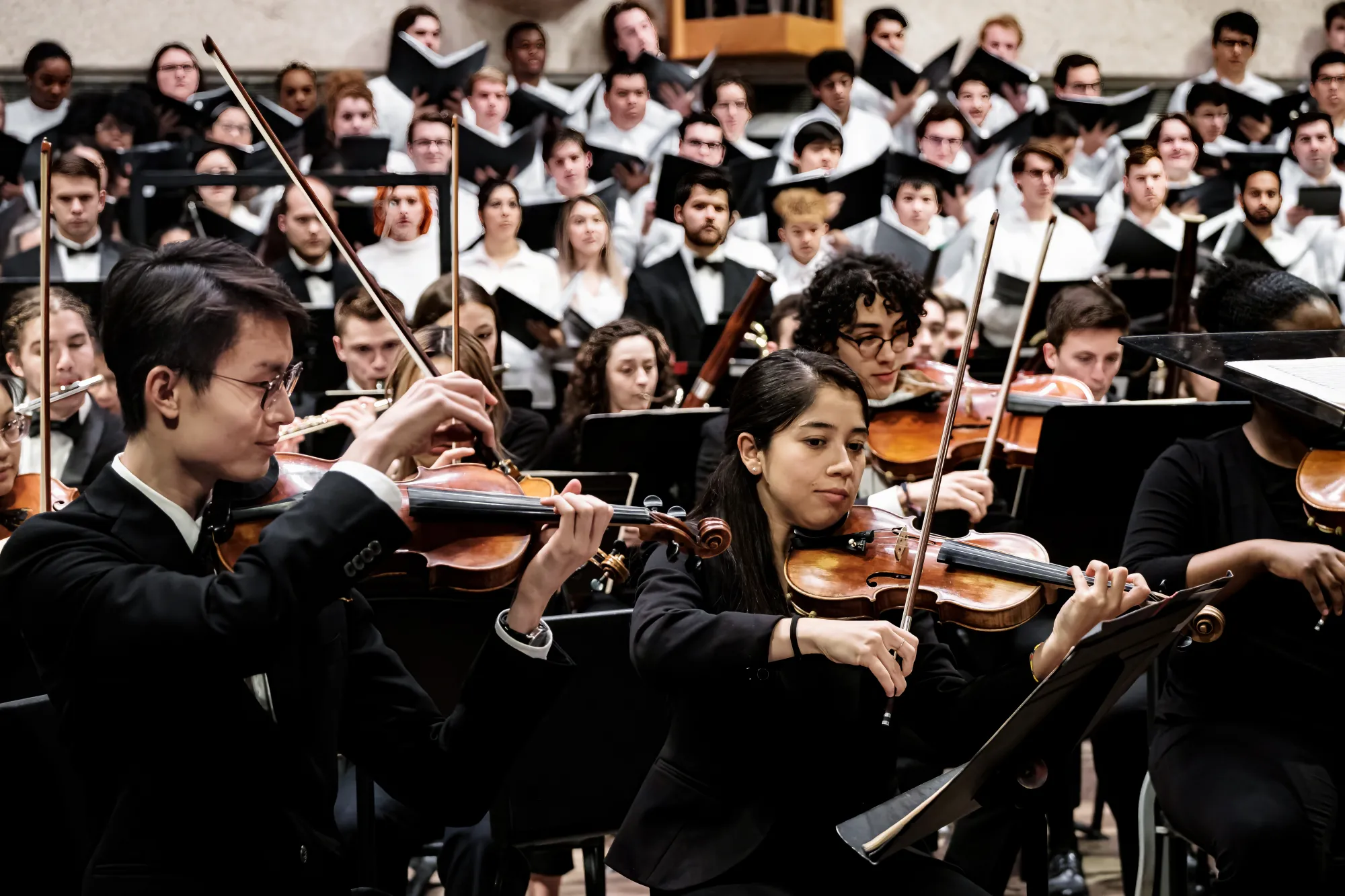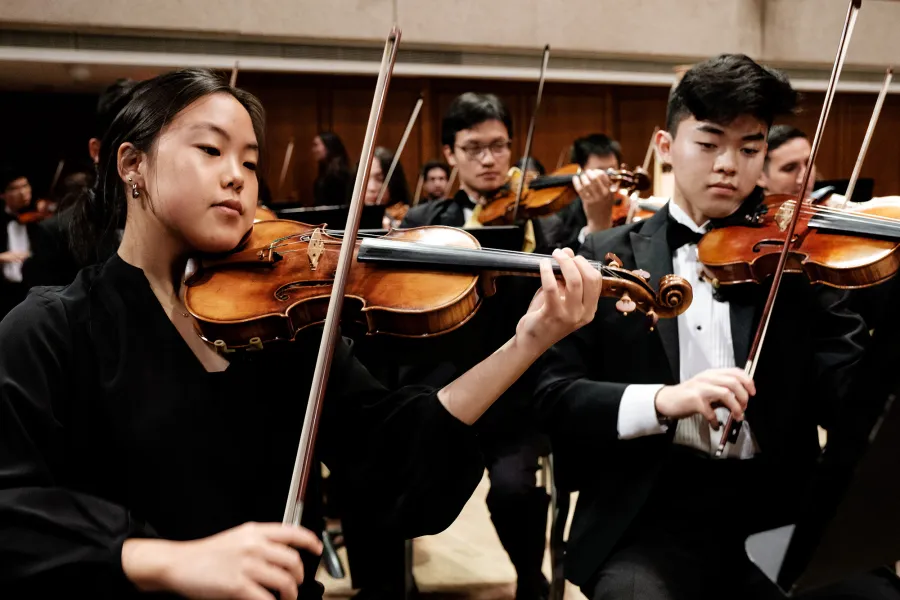Matthew Pavon, conductor
Chris Tran, conductor
This concert will last about 50 minutes with one intermission.
Please silence your electronic devices.
Photography, video, or recording of any part of this performance is prohibited
Program
Alexander Borodin
ed. Alexander Glazunov
Overture to Prince Igor
Matthew Pavon, conductor
intermission
Vasily Kalinnikov
Symphony No. 2, A Major
Moderato: Allegro non troppo
Andante cantabile
Matthew Pavon, conductor
Allegro scherzando
Andante cantabile - Allegro
Chris Tran, conductor
About the Program
Program notes by Mark Bilyeu
Alexander Borodin
Prince Igor Overture
Born November 12, 1833, St. Petersburg, Russia
Died February 27, 1887, St. Petersburg, Russia
Composed 1869-1889
Premiered November 5, 1887, St. Petersburg, Russian Symphonic Concert Nicolai Rimsky-Korsakov, conductor
Duration 11 minutes
“I ought to point out,” admitted Alexander Borodin, “that on the whole I am a composer in search of oblivion; and I’m always slightly ashamed to admit that I compose. For others it’s a simple matter, a vocation, an end in life; but for me it’s a recreation, an idle pastime, which provided diversion from my real work, my work as professor and scientist.” It’s hard to imagine that Borodin, one of the Russian composers dubbed the “Mighty Five” for their commitment to Russian nationalism, would have even been ashamed of the title. It’s possibly even harder to imagine that composing was a hobby for him amidst his career as a scientist. It is, however, this exact reason that, when Borodin died suddenly at a masquerade ball, his opera Prince Igor was left incomplete: he composed with no deadlines. The work was intended to be a four-act historical opera based on the life of medieval Russian Prince Igor Sviatoslavich (1151-1202), on recommendation from the critic Vladimir Stasov who believed the story ”met all the demands of Borodin’s talent and artistic nature: broad epic motifs, nationalism, variety of characters, passion, drama.” And, it did. Borodin tinkered with the opera for 18 years, and when he died, his colleagues from the Mighty Five (Rimsky-Korsakov and Glazunov especially) worked to compile, edit, and, oftentimes compose music to complete the work. “The overture was composed by me roughly according to Borodin’s plan,” Glazunov wrote later. “I took the themes from the corresponding numbers of the opera and was fortunate enough to find the canonic ending of the second subject among the composer’s sketches. I slightly altered the fanfares for the overture…. The bass progression in the middle I found noted down on a scrap of paper, and the combination of the two themes (Igor’s aria and a phrase from the trio) was also discovered among the composer’s papers. A few bars at the very end were composed by me.”
Vassili Kalinnikov
Symphony No 2 in A Major
Born January 13, 1866
Died January 11, 1901
Composed 1895-1897
Duration 37 minutes
Unlike Rachmaninoff, Tchaikovsky, or Rimsky-Korsakov, Vasily Kalinnikov is not a household name. It is rather likely that, like this annotator, you have never heard of him. And that is not your (our) fault! Kalinnikov was an exceptionally skilled musician who was dealt an exceptionally unfair hand. His music, however, stands as a gleaming example of Russian romanticism, and the opportunity we have now to explore his work is a gift. Despite becoming a church choir director at the age of 14, Vassili still could not afford tuition at the prestigious Moscow Conservatory, and instead studied at the Moscow Philharmonic Society School, where he received a bassoon scholarship. In 1893, at the age of 27, he contracted tuberculosis, a disease which would dictate the remainder of his life and career. Shortly after his diagnosis, he traveled to the shores of Yalta, believed to have healing and restorative properties. It was there that he composed his first symphony, which was an immediate success, receiving performances in Vienna, Paris, London, and Berlin. Wanting to capitalize on the fame, he quickly set out to craft his second symphony, honing his musical language along the way. The four movements alternate between a rhythmic vitality and a unique lyricism that even Tchaikovsky would envy. Kalinnikov remarked that the second movement came to him in a sleepless night when “the silence itself seems to vibrate.” The final movement collects the earlier themes and transforms them into an assured, bright conclusion. Kalinnikov would die only a few years later, two days before his thirty-fifth birthday. Perhaps we would be more familiar with his music had he lived longer; how fortunate we are to experience this symphony of his on this program!
About the Artists
Matthew Pavon

Matthew Pavon is a conductor and violist studying orchestral conducting under Farkhad Khudyev at The Butler School of Music. In his role as assistant instructor for university orchestras, Matthew is an active conductor and administrator for Symphony Orchestra. He also serves as Co-Director for University Orchestra. Matthew holds viola performance degrees from Evangel University (B.M. '19) and Missouri State University (M.M. '22). Guest conducting appearances have included concerts with the Austin Civic, Kansas City Civic, Missouri State University Symphony, Drury University, and Kansas City Youth Symphony, and Missouri Philharmonic Orchestras. As a violist, he was an active member of the Springfield Symphony Orchestra for seven years and a substitute violist for the Symphony of Northwest Arkansas. Matthew’s passion is connecting with people of all ages and backgrounds through music. He lives in Austin, TX, with his wife, Leianna, and their two mini-Australian Shepherds, Koda and Ellie.
Chris Tran

Chris Tran is co-director of The University of Texas University Orchestra, graduate teaching assistant for the University of Texas Orchestras, and is currently pursuing a doctor of musical arts in orchestral conducting with Farkhad Khudyev at The University of Texas at Austin. Mr. Tran has been an invited conductor at several masterclasses and workshops in Boulder, Los Angeles, Eugene, St. Andrews (Scotland), as well as the Cabrillo Festival of Contemporary Music with Cristian Măcelaru, Thomas Sleeper, and Leonard Slatkin, and the International Conducting Workshop and Festival with the late Larry Rachleff and Donald Schleicher. He has also worked with conductors Neil Thomson, Jeff Grogan, and Sian Edwards. Mr. Tran earned a master of music in orchestral conducting from the University of Colorado Boulder with Gary Lewis, and a bachelor of music in music education from Southern Methodist University. His conducting mentors include Nicholas Carthy and Paul Phillips. He studied violin with Charles Wetherbee, former concertmaster of the Boulder Philharmonic, and Diane Kitzman, former principal violin of the Dallas Symphony.
University ORchestra
Violin I
Evelyn Lee, concertmaster
Christian Dipert
Brandon Mendoza
Emily Tando
Naomi Fokkens
Evan Le
Felipe Benitez
Peter Stone
Angelica Sharma
Thomas Feng
Jacob Hanson
Jailyn Barnuevo
Cannon Bates
Page Tan
Rachel Kim
Rudhran Sathish
Violin II
Kylie Hung, principal
Joaquin Alvarez
Lauren Heyde
Jasmine chou
Eric Liang
Qian Hu
Ursula Weissfeld
Jessica Lin
Mohini Bhave
Ximena Cazares
Holden Tom
Joseph McPeek
Jack Johnson
Viola
Rachel Su, principal
Wonkuk Lee
Amy Ning
Shota Sawada
Randy Guo
Daniel Kim
Caroline Hughes
Ash Roberts
Edward Visaya
Audrey Sohn
Gauri Binup
Angela Zhang
Jaela Barrera
Cello
James Tabanao, principal
Kaye Chen
Rei Iwahara
Daniel Tepedino
Anthony Hermez
Aarya Patel
Michael Chung
Kunal Manish
Emile Meyrat
Irene Benavides-Perez
Drew Warninghoff
Kayva Gour-Gupta
Allison Tseng
Domenica Aburto de la Fuente
Bass
Dezhou Gao, principal
Brandon Chiu
Emily Layton
Aravind Shandilya
Chloe Mamitag
Ryan Webster
Flute
Namrata Boggaram
Pari Deshpande
Camila Martinez
Oboe
Noah Bihan
Kyra Ullman
Vibha Immedisetty
Clarinet
Jusun Chung
Brian Kim
David Leal
Bassoon
Owen Schaefer
Gavin Remo
Horn
Dhanush Jain
Jenny Wu
David Finecy
Uriel Reyes
Trumpet
Nathan Harward
Americo Zapata
Trombone
Jackson Hawk
Landon Reimer
Hudson Pedrotti
Tuba
Chancellor Joseph
Percussion
Aizen West
Michael Stephens
Harp
Hannah Beeler
Upcoming Events

Mahler Symphony No. 2, Resurrection
Symphony Orchestra & Combined Choirs
Leah Crocetto, soprano
Sophio Dzidziguri, mezzo soprano
One of the most beloved symphonies in the canon, Mahler's "Resurrection" symphony boasts a large orchestra, mezzo and soprano soloists, and similarly to Beethoven's 9th Symphony, a large choir in the final movement. For this performance, the Butler School's Concert Chorale and University Chorus ensembles will join forces; they will be joined by Butler School alumni singers and community choral singers from around Austin.
Tuesday, March 31, 8:00 p.m.
Long Center for the Performing Arts
SYMPHONY ORCHESTRA
Wednesday, October 15, 7:30 p.m.
Bates Recital Hall
SYMPHONY ORCHESTRA
Saturday, November 8, 7:30 p.m.
Bates Recital Hall
UNIVERSITY ORCHESTRA
Tuesday, November 18, 7:30 p.m.
Bates Rectial Hall
Event Details
Free admission


